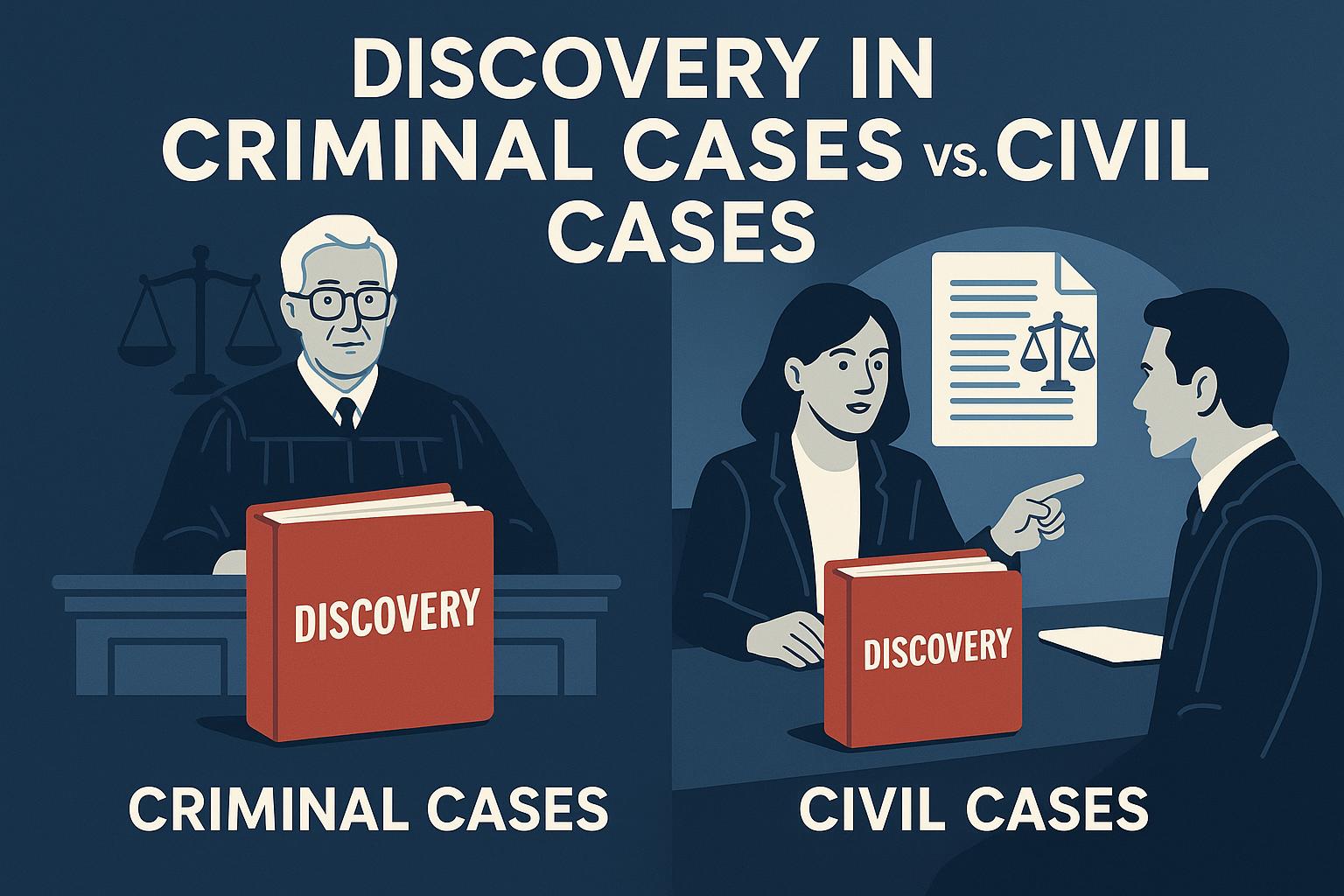Understanding Discovery in Criminal and Civil Cases
In the legal world, the term discovery refers to the pre-trial process where each party involved in a dispute requests evidence and information from the other side. This process aims to ensure transparency and prevent surprises during trial. While the discovery process is an essential part of both criminal and civil cases, the rules and procedures differ significantly between the two.
Discovery in Criminal Cases
The discovery process in criminal cases is primarily governed by constitutional, statutory, and case law. Its principal objective is to safeguard the accused’s right to a fair trial by ensuring they have access to the evidence that the prosecution plans to use against them.
Prosecution’s Obligations
In criminal cases, prosecutors have a duty to disclose all evidence that is exculpatory—meaning evidence that is favorable to the defense and material to the defendant’s guilt or punishment. This obligation stems from the U.S. Supreme Court’s decision in Brady v. Maryland. Failure to disclose such evidence can result in the dismissal of charges or a reversal of a conviction. This sets a high standard for the prosecution, emphasizing the importance of fairness and justice over simply securing a conviction.
Defense’s Rights
The defense also has specific discovery rights, although they are generally more limited than those of the prosecution. Defendants can request access to police reports, witness statements, and other evidence that the prosecution intends to present during the trial. However, the defense is not typically required to disclose evidence to the prosecution unless they plan to use it during the trial, as outlined by the rules of court. This reflects a balance between the rights of the accused and the efficient running of the legal process.
Discovery in Civil Cases
Civil cases, which involve disputes between individuals or organizations rather than criminal charges brought by the state, have a more expansive discovery process governed by the rules of civil procedure. The goal of discovery in civil litigation is to allow both parties to gather information to build their cases.
Scope and Methods
The scope of discovery in civil cases is broader than in criminal cases. Parties may request any information that is relevant to the case or is likely to lead to the discovery of admissible evidence. Common discovery methods include depositions (sworn statements taken before trial), interrogatories (written questions requiring written answers), requests for production of documents, and requests for admission. This extensive scope enables parties to thoroughly understand the facts and prepare their arguments comprehensively.
Obligations of Parties
In civil litigation, both parties have reciprocal obligations to share relevant information and respond in good faith to discovery requests. Parties must answer questions, produce documents, and provide access to evidence as requested, unless they have a valid legal objection, such as the information being privileged or overly burdensome to produce. This mutual exchange of information seeks to level the playing field and improve the chances of a fair outcome.
Comparative Overview
While both criminal and civil cases require the sharing of evidence through discovery, the processes serve different purposes and operate under distinct rules. In criminal cases, the focus is on the constitutional rights of the defendant and ensuring a fair trial, whereas in civil cases, the objective is to enable both parties to prepare adequately for trial by having equal access to relevant information. Understanding these differences is crucial for anyone involved in legal proceedings.
Detailed Examination of Discovery Tools in Civil Cases
Civil discovery encompasses various methods aimed at procuring essential information:
– **Depositions:** These involve oral questioning of a party or witness under oath before the trial. It serves as an opportunity for attorneys to gather testimonies and evaluate the credibility of witnesses.
– **Interrogatories:** These consist of written questions sent by one party to another, requiring written responses under oath. They are useful for obtaining factual information and clarifying positions.
– **Requests for Production:** This tool demands the sharing of documents, electronically stored information, or tangible evidence relevant to the case. It enables parties to scrutinize the exact evidence the opposing counsel might use.
– **Requests for Admission:** This approach allows one party to request admitting the truth of any matters related to facts or the authenticity of documents, simplifying issues that need to be addressed at trial.
These varied tools facilitate the comprehensive exchange of pertinent information, thus refining the trial’s focus to the truly contested issues.
Challenges and Strategic Use of Discovery
Despite its benefits, the discovery process poses challenges. It can become time-consuming and costly, especially if parties engage in extensive requests or resist compliance. Thus, effective legal strategy often involves judicious use of discovery:
– **Negotiation and Settlement:** Information obtained during discovery might prompt parties to reconsider their positions, paving the way for settlement resolutions.
– **Pre-Trial Motions:** Discovery outcomes can influence motions such as summary judgments, where one party seeks to win the case without a trial based on uncovered evidence showing no dispute over material facts.
– **Trial Preparation:** Effective use of discovery allows for meticulous trial preparation, from witness questioning to exhibit presentations, affording parties confidence in their case’s presentation.
Conclusion
Discovery serves as a foundational aspect of both criminal and civil cases, albeit with differing implications and applications. In criminal proceedings, it underscores the criticality of upholding a defendant’s right to a fair trial. Conversely, in civil disputes, it aids in equipping parties with comparable access to evidence, fostering informed resolutions. Understanding the nuances and strategic uses of discovery is indispensable for those navigating legal processes, mandating a balance between comprehensive information exchange and efficient case resolution.
